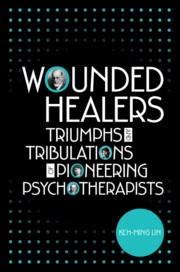Book contents
- Wounded Healers
- Advance Praise for Wounded Healers
- Wounded Healers
- Copyright page
- Contents
- Acknowledgments
- Introduction
- Part I Fin-de-Siècle Vienna
- 1 Sometimes a Cigar Is Just a Cigar
- 2 A Most Dangerous Method
- 3 We Are Abel: We Are Cain
- 4 Fear of Death and Trauma of Birth
- 5 From Character Analysis to Cloud Busting
- 6 Ernest Jones
- 7 Estranged Brilliance
- 8 When Freud Met Tiffany
- 9 Phoenix Forever
- Part II From Sea to Shining Sea
- References
- Index
9 - Phoenix Forever
Viktor Frankl and the Origin of Logotherapy
from Part I - Fin-de-Siècle Vienna
Published online by Cambridge University Press: 17 December 2020
- Wounded Healers
- Advance Praise for Wounded Healers
- Wounded Healers
- Copyright page
- Contents
- Acknowledgments
- Introduction
- Part I Fin-de-Siècle Vienna
- 1 Sometimes a Cigar Is Just a Cigar
- 2 A Most Dangerous Method
- 3 We Are Abel: We Are Cain
- 4 Fear of Death and Trauma of Birth
- 5 From Character Analysis to Cloud Busting
- 6 Ernest Jones
- 7 Estranged Brilliance
- 8 When Freud Met Tiffany
- 9 Phoenix Forever
- Part II From Sea to Shining Sea
- References
- Index
Summary
Best known for his book, Man’s Search for Meaning, Viktor Frankl was a prodigy who became interested in psychotherapy in his high-school years. He was briefly associated with Freud’s and Adler’s groups, but soon departed from both to develop his own treatment methods. During World War II he was incarcerated in various concentration camps, and narrowly escaped death in Auschwitz, only to face the reality that practically all of his family members had perished and he was utterly alone in the world. Writing about his Holocaust experiences saved him from despair and suicide, and helped him to develop a method of therapy based on man’s “will to meaning,” which he called “logotherapy.” Frankl’s insight on the primacy and indispensability of meaning and meaning-making in life has had profound influences on subsequent developments in existential-humanistic psychotherapy, as well as on understanding mental health issues in refugees and survivors of traumatic life experiences. The chapter ends with discussions on the importance of finding meaning in work, creativity, spiritual merging, and love, as well as in suffering (transcendental meaning).
Keywords
- Type
- Chapter
- Information
- Wounded HealersTribulations and Triumphs of Pioneering Psychotherapists, pp. 123 - 136Publisher: Cambridge University PressPrint publication year: 2020

